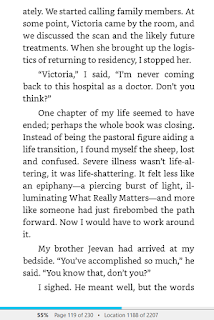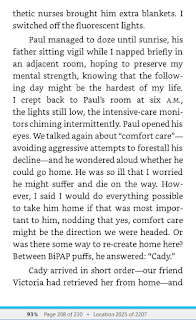









Quiz
-
What type of cancer was Paul diagnosed with?
-
Paul said severe illness wasn’t life-altering, it was ____________.
-
Why were the doctors worried about pneumonia?
-
Instead of intubation, what could Paul choose?
- What was Paul’s wife’s way of recreating home while in the hospital?
What type of cancer was Paul diagnosed with?
Paul said severe illness wasn’t life-altering, it was ____________.
Why were the doctors worried about pneumonia?
Instead of intubation, what could Paul choose?
Discussion Questions
-
Is it ethical to withhold Paul’s diploma from Medical school if he can't handle a full workload as a chief resident because of his lung cancer?
-
Did Paul do the right thing by going back to work once he got healthier?
-
Was it fair wanting to have a child, when Paul knew that his health was in jeopardy?
-
When we are faced with someone who is dealing with grief, what is the best way to go about helping them?
-
Is it easier telling an older individual that they are going to die versus telling a younger person?
-
If you were Paul, would you want to be intubated at the end of your life? Resuscitated?
Lucy Kalinithi... "My Marriage Didn't End When I Became a Widow"... pdf download... goodreads
When Dr. Paul Kalanithi sent his best friend an email in May 2013 revealing that he had terminal cancer, he wrote: “The good news is that I’ve already outlived two Brontës, Keats and Stephen Crane. The bad news is that I haven’t written anything.” It was a jokey way of dealing with the unthinkable but also an indication of Dr. Kalanithi’s tremendous ambition. He had led a fascinating life and was not about to leave it unchronicled.
The bittersweet news is that in the 22 months left to him, Dr. Kalanithi, who died at 37, went on to write a great, indelible book, “When Breath Becomes Air,” that is as intimate and illuminating as Atul Gawande’s “Being Mortal,” to cite only one recent example of a doctor’s book that has had exceptionally wide appeal. To paraphrase Abraham Verghese’s introduction, to read this book is to feel that Dr. Kalanithi still lives, with enormous power to influence the lives of others even though he is gone.
Dr. Verghese suggests not only reading “When Breath Becomes Air” but also listening to the overwhelming response it prompts in you. I guarantee that finishing this book and then forgetting about it is simply not an option. There is so much here that lingers, and not just about matters of life and death: One of the most poignant things about Dr. Kalanithi’s story is that he had postponed learning how to live while pursuing his career in neurosurgery. By the time he was ready to enjoy a life outside the operating room, what he needed to learn was how to die... (continues)
Is it ethical to withhold Paul’s diploma from Medical school if he can't handle a full workload as a chief resident because of his lung cancer?
Did Paul do the right thing by going back to work once he got healthier?
Was it fair wanting to have a child, when Paul knew that his health was in jeopardy?
When we are faced with someone who is dealing with grief, what is the best way to go about helping them?
Is it easier telling an older individual that they are going to die versus telling a younger person?
If you were Paul, would you want to be intubated at the end of your life? Resuscitated?
Thanks for posting promptly, you've set the right precedent! I encourage everyone to chime in with your own alternative questions, comments, etc.
ReplyDeleteWhen we are faced with someone who is dealing with grief, what is the best way to go about helping them?
ReplyDeleteI think the best way of helping someone who is grieving is to comfort them. Be there in a way to help them grief, but also there to take their mind off of the situation
1. What identity does Paul say no longer matters after he and he wife observe the CT scans of the tumors?
ReplyDelete2. What does Paul claim to see at the “crossroads” instead of the “footprints of the countless patients [he] had treated over the years.”?
3. Why had Paul remained lucid for quite a while, despite the fact that his carbon-dioxide levels were higher than normal?
4. Intubation was the intervention for what temporary solution?
5. What was the most likely cause of Paul’s respiratory failure, and what treatment needed to be started if at all?
6. What is Paul’s attitude towards the end of the except given?
Is it ethical to withhold Paul’s diploma from Medical school if he can't handle a full workload as a chief resident because of his lung cancer?
ReplyDeleteI think it is important to have an objective view of this situation. If someone cannot uphold the requirements of an occupation, then they should not be able to hold that office so that another individual can come and perform the job more efficiently. Of course, in a more sympathetic stance, I believe it's unfair to have one's diploma withheld simply because of illness, despite possible necessity.
Extra discussion questions
ReplyDelete1. How would you go about explaining to a child what cancer is and why that person will not be around anymore?
2. If you were in Paul's position, how would you spend the last few months of your life?Would you cherish moments with family or do something you always wanted to do.
3. If you had to make a life altering/ life shattering decision would you make it? Or would you let someone else make it for you?
1.) I think it depends on the maturity of the child. If they are able to comprehend death, then I think they can understand a reason why a people dies. On the other hand, if a child cannot comprehend such concepts, then it may be best to tell them either the truth and further explain as the child gets older. Or simply lie to the child.
Delete2. I don't see why you couldn't do both. Take a trip with your family. Or maybe knock out a bucket list. I think having memoriable moments with people you love is the way to spend your time before you go.
3. As Campbell mentioned in his sections about consent, if a person is able to make a decision, unhindered by mental instability, then they should be able to make a decision for themselves. That being said, I think advice is appropriate but at the end of the day, it's up to the individual.
https://m.youtube.com/watch?v=vdepwj-aw24
ReplyDeleteThis is an intro to the Bucket List Movie that is really good in context of leaving loved ones behind with a terminally ill disease.
Also worth a look, in light of the Kalithi's story: Randy Pausch's "Last Lecture" - http://www.youtube.com/watch?v=ji5_MqicxSo
ReplyDeleteDQs-
“Human knowledge is never contained in one person. It grows from the relationships we create between each other and the world, and still it is never complete.” Do you think this attitude of collaborative humility is prevalent among physicians and other health care providers? What practical difference in treatment might it make?
“Will having a newborn distract from the time we have together?" she asked. "Don't you think saying goodbye to your child will make your death more painful?" Or do children make death AND life more meaningful?
"Lucy and I both felt that life wasn't about avoiding suffering.” Can a physician profess this attitude compatibly with upholding the Hippocratic Oath?
"Before operating on a patient’s brain, I realized, I must first understand his mind: his identity, his values, what makes his life worth living, and what devastation makes it reasonable to let that life end." Is this degree of emotional attachment to patients professionally sustainable? Is it an admirable aspiration, probably impossible to achieve?
"Death may be a one-time event, but living with terminal illness is a process.” Isn't life a terminal illness? Have we undervalued the process?
“Science may provide the most useful way to organize empirical, reproducible data, but its power to do so is predicated on its inability to grasp the most central aspects of human life: hope, fear, love, hate, beauty, envy, honor, weakness, striving, suffering, virtue.” That's a powerful indictment. Does he meaning inability, or unwillingness?
Comment: “I began to realize that coming in such close contact with my own mortality had changed both nothing and everything. Before my cancer was diagnosed, I knew that someday I would die, but I didn’t know when. After the diagnosis, I knew that someday I would die, but I didn’t know when. But now I knew it acutely. The problem wasn’t really a scientific one. The fact of death is unsettling. Yet there is no other way to live.”
Comment: “The physician’s duty is not to stave off death or return patients to their old lives, but to take into our arms a patient and family whose lives have disintegrated and work until they can stand back up and face, and make sense of, their own existence.”
Comment: “Grand illnesses are supposed to be life-clarifying. Instead, I knew I was going to die—but I’d known that before. My state of knowledge was the same, but my ability to make lunch plans had been shot to hell. The way forward would seem obvious, if only I knew how many months or years I had left. Tell me three months, I’d spend time with family. Tell me one year, I’d write a book. Give me ten years, I’d get back to treating diseases. The truth that you live one day at a time didn’t help: What was I supposed to do with that day?”
Was it fair wanting to have a child, when Paul knew that his health was in jeopardy?
ReplyDeleteOn one end of the argument, it is up to the individual on whether or not they feel the need to have children or not. It could be that they want to continue on their family despite the fact that they will be gone. However at the other end, the child will be fatherless and potentially hold the chance the develop cancer later on. It's a difficult decision and should be made by the individual.
DQs
ReplyDelete. I believe for a lot of people it is easier to tell someone who is older they have a terminal illness because we assume that they have already lived a full life, while a younger patient we might feel has more potential with their life, and should have more time to experience life.
. As far as intubation goes, I'd want to be intubated as long as there was a chance of recovery to where I could live my life in a dignified manner. If I was doomed to a vegetative state with no chance of recovery then intubation would not be preferred.
. As far as dealing with a person going through grief, I believe all you can do is be there for the person. You most be catious, for over involvement can results in delaying the grieving process for the individual.
ReplyDeleteI agree completely with you. I feel like,however that his decision was not a selfish decision at all. At the end of his life his daughter brought him happiness. This bond between father and daughter should be felt even when life is unfair to take it away.
ReplyDelete